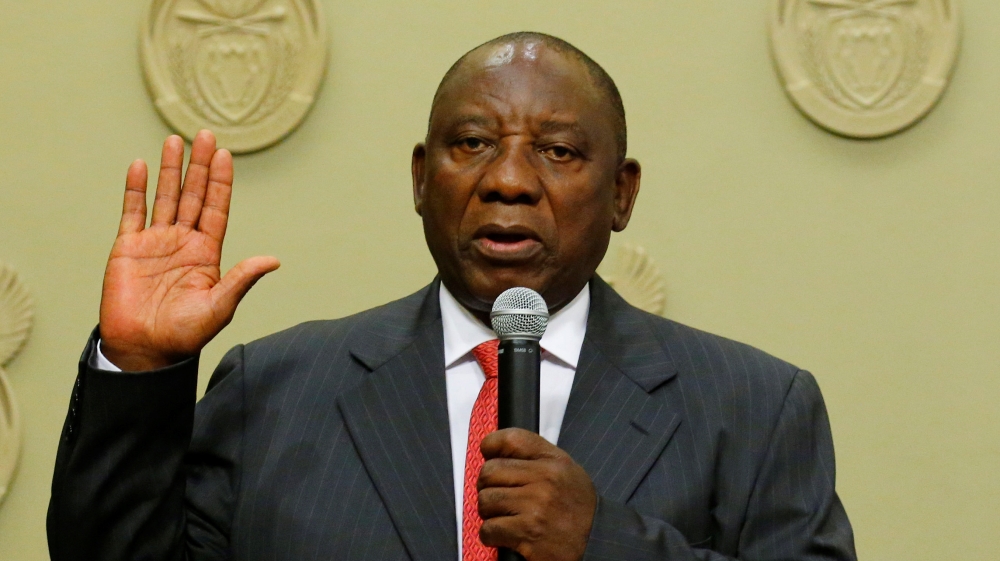Land reform a key issue before elections next year, experts say, turning up debate over legacy of apartheid.

Johannesburg, South Africa – Last week, US President Donald Trump ignited a firestorm when he decided to wade into the sensitive land debate in South Africa.
Trump wrote in a tweet that he had asked Mike Pompeo, the US secretary of state, to look into “land and farm seizures” and “large scale killings of white farmers”.
Trump’s comment came after he watched a six-minute segment on the issue on Fox News, a conservative US broadcaster. The president was immediately condemned by the South African government and his comments raised the ire of many South Africans, a majority of whom, 24 years after the end of apartheid, are still waiting for land reform to take place.
The question of land remains among the most sensitive and divisive in the country.
Apartheid was, at its core, a system of separate and discriminatory development, with black South Africans either dispossessed or denied access to land, infrastructure and resources, while their white counterparts were given preferential treatment and access to the economy.
The legacies of apartheid persist to this day, with social and economic inequality preserved and perpetuated due to the lack of economic transformation.
Al Jazeera answers the key questions about the fraught and complicated land debate in the country.
Who owns land in South Africa?
Following the end of apartheid in 1994, the ruling African National Congress (ANC) said it would redistribute 30 percent of white-owned commercial farmland to black farmers.
“Our estimate is that [today] 9.7 percent of white commercial farmland has been transferred to black people since 1994,” Ruth Hall, from the Institute of Poverty, Land and Agrarian Studies (Plaas), based in Cape Town, says.
It is estimated that white South Africans, who make up around nine percent of the population, own around 73 percent of the commercial agricultural land.
As it stands, black people own more than 50 percent of agricultural land in just two of the country’s nine provinces.
Are white farmers being targeted and murdered?
Claims that white farmers are being disproportionately targeted and killed, or that a “white genocide” is taking place in South Africa have been repeatedly refuted.
Agri SA, an agricultural industry association based in Pretoria, reported in June that 47 farmers were killed between 2017 and 2018 – the lowest in 20 years. Omri van Zyl, Agri SA’s executive director, told Al Jazeera that despite the numbers, the organisation still feels that there are a “disproportionate number of farm murders”.
Between 2016 and 2017, there were 19,016 murders in South Africa, translating into a murder rate of 34.1 per 100,000 people. Police statistics indicate that during the same period, there were 74 farm murders.
These include farmers and workers of all race groups.
Afriforum, a right-wing lobby group that has both welcomed and taken credit for informing Trump’s tweet, claims that the murders of farmers translate into a murder rate of 156 per 100,000 people, or 4.5 times higher chance of getting murdered than the average South African.
Fact-checking website Africheck has repeatedly refuted Afriforum’s statistics, arguing that given that it is not clear how many people live and work on farms, the group’s numbers are fundamentally flawed.
There remains no evidence to suggest that farmers as a group suffer more attacks than any other demographic in the country.

Why has land reform been so slow?
Since 1994, the government has followed a “willing seller, willing buyer” model in which it has bought white-owned farms for redistribution. But this process has been slow, with the ANC accusing landowners of inflating farm prices and therefore hindering redistribution.
Experts, meanwhile, say the primary reason land reform has been slow is due to a lack of political will.
“Land reform has never accounted for more than one percent of the national budget. And this means the programme has been constrained by a limited budget.” Hall, from Plaas, says.
“The second reason is that the department of rural development is extremely weak. We don’t have a lot of state capacity to implement their policies … We estimate that six percent of all commercial farms are bought and sold each year, so we could be going a lot faster [if there was more money].”
Likewise, Tembeka Ngcukaitobi, author of The land is ours: Black Lawyers and the Birth of Constitutionalism in South Africa, says that the law was designed to help government redistribute land but “no explanation has been given as to why this has not happened”.
In other words, “the ANC tolerated a slow and failing land programme for more than two decades”, Hall adds.
Is the Constitution to blame?
The ANC has been consistently reprimanded for its slow land reform policy. Pressure has been building on the ruling party, especially from the Economic Freedom Fighters (EFF), the third-largest party in the country, who have turned the land issue into a key election campaign topic.
With national elections due to take place in 2019, the ANC is at pains to illustrate that it is taking the concerns of the large black majority – who remain poor, landless and on the fringes of the economy – on board.
“This has become a party political issue for the first time, and people are aligning themselves with parties based on their position on land,” Hall says.
At its national conference in December 2017, the ANC resolved to expropriate land without compensation as a means to speed up land reform. This then ushered in talk of amending Section 25 of the Constitution in order to allow expropriation without compensation to take place.
“It has become pertinently clear that our people want the constitution to be more explicit about expropriation of land without compensation as demonstrated in the public hearings,” party leader and South African President Cyril Ramaphosa said.





